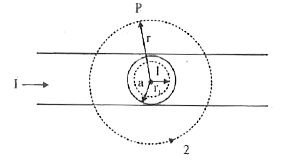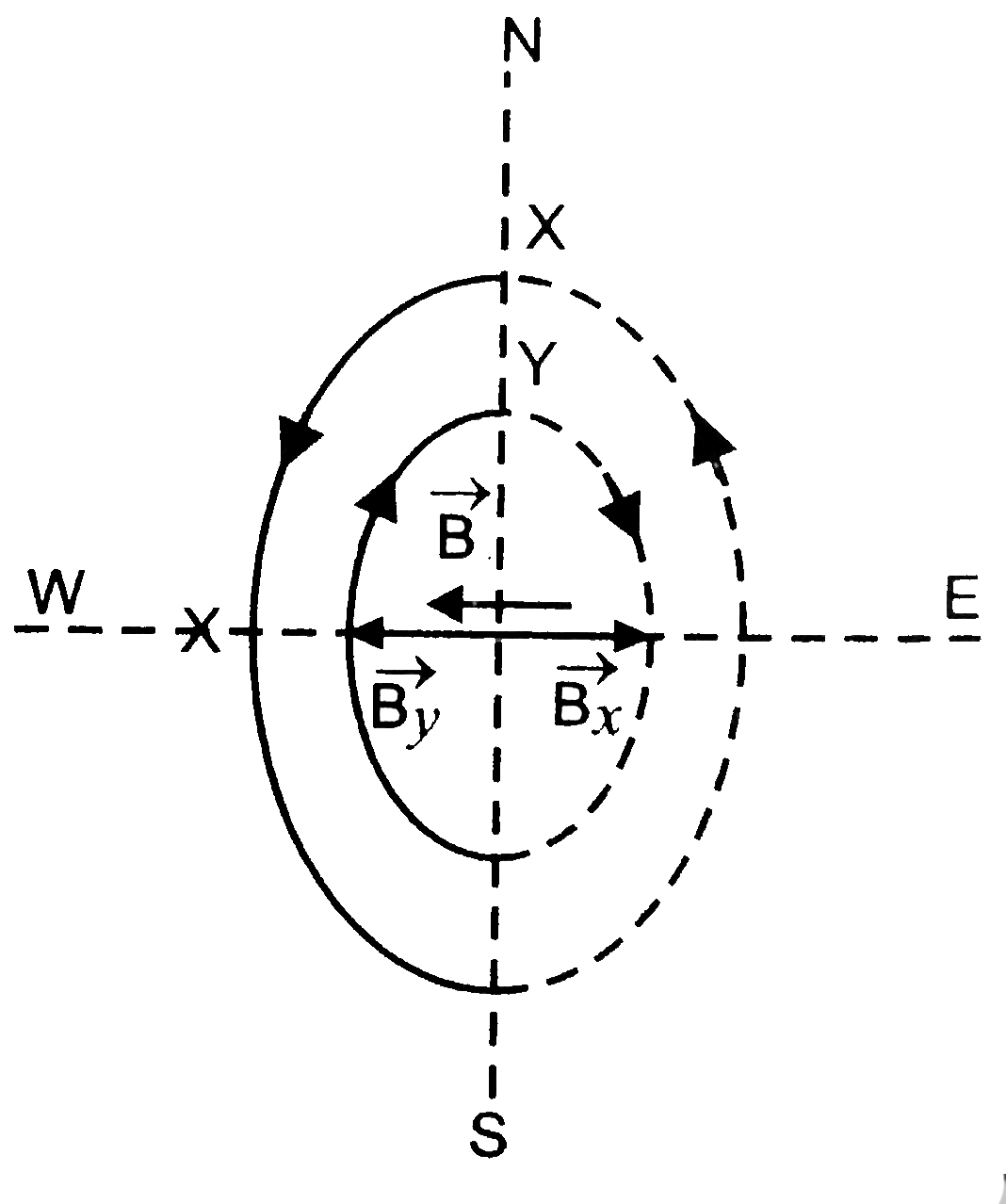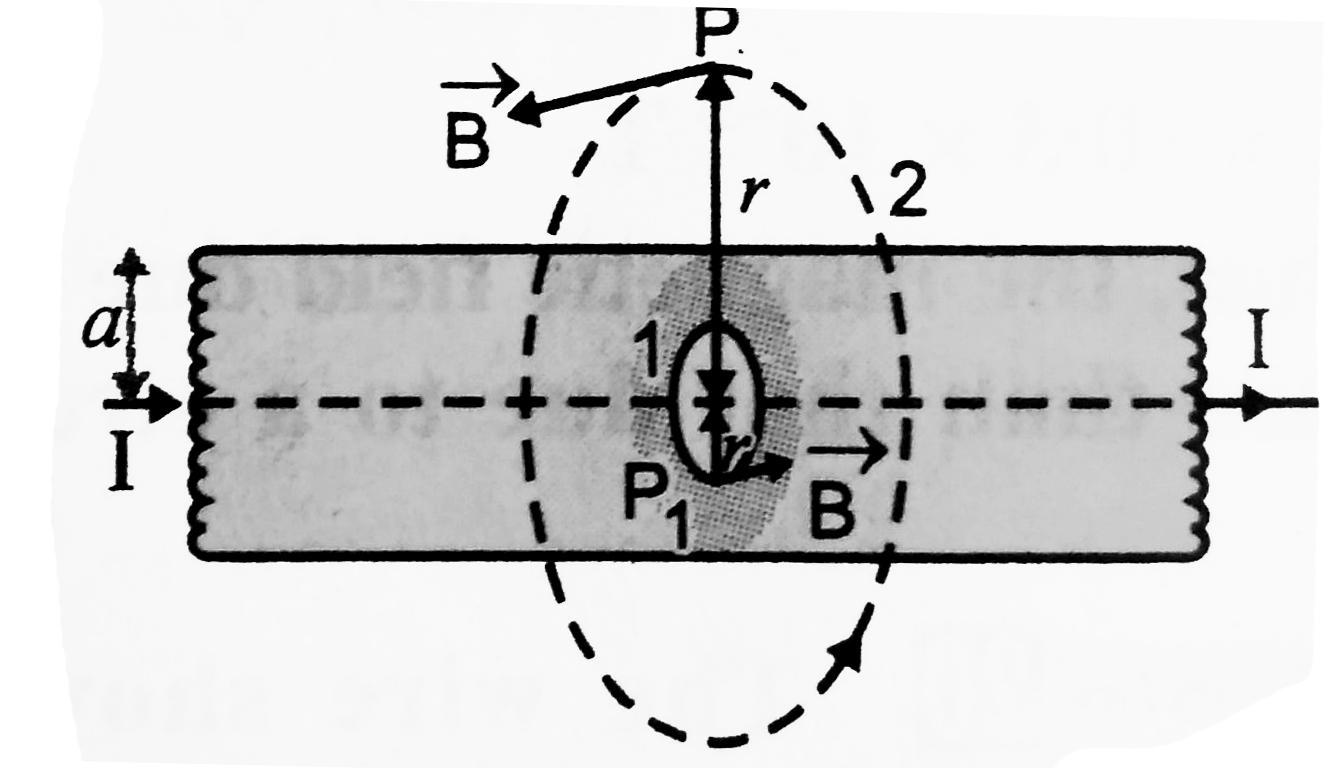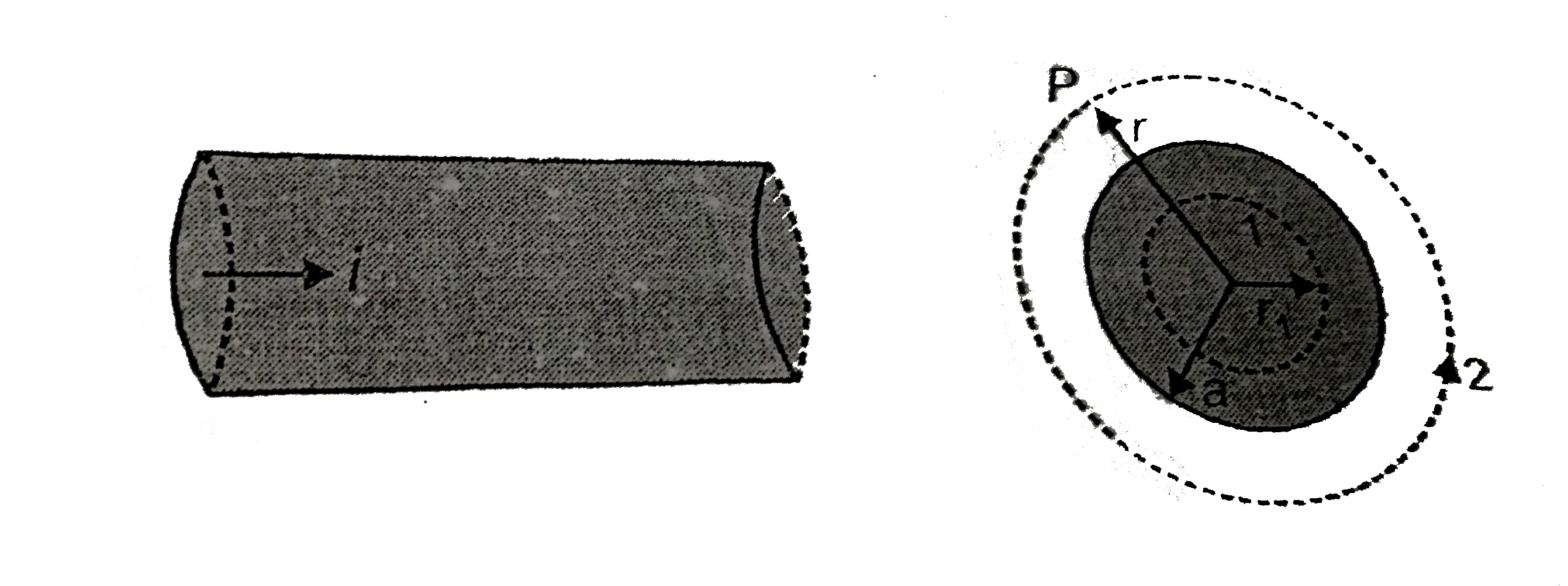Figure shows a long straight wire of a circular cross - section (radius a) carrying steady current I. The current I is uniformly distributed across this cross - section . Calculate the magnetic field in the region r<a and r>a
 Solution in Tamil
Solution in Tamil
(a) Consider the case r > a. The Amperian loop, labelled 2, is a circle concentric with the cross-section. For this loop,
L=2πr
Ie = Current enclosed by the loop = I
The result is the familiar expression for a long straight wire
B(2πr)=μ0I
B=μ0I2πr
B∝1r(r>a)
(b) Consider the case r < a. The Amperian loop is a circle labelled 1. For this loop, taking the radius of the circle to be r,
L=2πr
Now the current enclosed Ie is not I, but is less than this value. Since the current distribution is uniform, the current enclosed is,
Ie=I(πr2πa2)=Ir2a2
Using ampere law B(2πr)=μ0Ir2a2
B=(μ0I2a2)r
B∝r (r<a)

Figure shows a plot of the magnitude of B with distance r from the centre of the wire. The direction of the field is tangential to the respective circular loop (1 or 2) and given by the right-hand rule described earlier in this section. This example possesses the required symmetry so that Ampere’s law can be applied readily.
Topper's Solved these Questions
- MOVING CHARGES AND MAGNETISM BOOK - NCERT TAMILCHAPTER - MOVING CHARGES AND MAGNETISM EXERCISE - EXERCISE
13 Videos
- MOVING CHARGES AND MAGNETISM BOOK - NCERT TAMILCHAPTER - MOVING CHARGES AND MAGNETISM EXERCISE - ADDITIONAL EXERCISES
17 Videos
- MAGNETISM AND MATTERBOOK - NCERT TAMILCHAPTER - MAGNETISM AND MATTEREXERCISE - Additional Exercises
19 Videos
- NUCLEIBOOK - NCERT TAMILCHAPTER - NUCLEIEXERCISE - ADDITIONAL EXERCISES
9 Videos
Similar Questions
A circular coil of wire consisting of 100 turns, each of radius 8⋅0cm carries a current of 0⋅40A.
What is the magnetude of the magnetic field →B at the centre of the coil?
View SolutionTwo concentric coil X and Y of radii 16cm and 10cm respectively lie in the same vertical plane containing the north-south direction. Coil X has 20 turns and carries a current of 16A, coil Y has 25 turns and carries a current of 18A. The sense of current in X is anti-clockwise and in Y, clockwise, for an observer looking at the coil facing west, Figure. Give the magnitude and direction of the net magnetic field due to the coils at their centre.

View SolutionAnswer the following questions .
a. Why does a paramagnetic sample display greater magnetisation (for the same magnetising field) when cooled ?
b. Why is diamagnetism , in contrast , almost independent of temperature ?
c. If a toroid uses bismuth for its core, will the the field in the core be (slightly ) greater or (slightly ) less than when the core is empty ?
d. Is the permeability of a ferromagnetic material independent of the magnetic field ? If not, is it more for lower or higher fields ?
e. Magnetic field lines are always nearly normal to the surface of ferreomgnet at every point . (This fact is analogous to the static electric field lines being normal to the surface of conductor at every point). Why ?
f. Would the maximum possible magnetisation of paramagnetic sample be of the same order of magnitude as the magnetisation of ferromagnet ?
View SolutionIn a periodic table, the average atomic mass of magnesium is given as 24.312u. The average value is based on their relative natural abundance on earth. The three isotopes and their masses are .12Mg24(23.98504u), .12Mg25(24.98584) and .12Mg26(25.98259u). The natural abundance of .12Mg24 is 78.99% by mass. Calculate the abundances of the other two isotopes.
View SolutionFigure shows a long straight wire of circular crosssection (radius a) carrying steady current I. The current I is uniformly distributed across this crosssection. Calculate the magnetic field in the region r<a and r>a.

View SolutionFigure shows a long straight wire of a circular cross-section (radius a) carrying steady current l. The current l is uniformly distributed across this cross-section. Calculate the magnetic field in the region r<aandr>a

View SolutionFigure shows the circular cross-section of a long straight wire of radius a carrying steady current I. The current I is uniformly distributed across this cross-section. Calculate the magnetic field in the region r lt a (dashed inner circle) and r gt a (dashed outer circle).
View SolutionFigure shows a long straight wire of circular crosssection (radius a) carrying steady current I. The current I is uniformly distributed across this crosssection. Calculate the magnetic field in the region r<a and r>a.

View SolutionFigure shows a long straight wire of a circular cross - section (radius a) carrying steady current I. The current I is uniformly distributed across this cross - section . Calculate the magnetic field in the region r lt a and r gt a
View SolutionThe adjoining figure shows a long straight wire of a circular cross section (radius a) carrying steady current I. The current I is uniformly distributed across its cross section. Calculate the magnetic field at a distance from its axis for (i) r lt a , (ii) r gt a .
View SolutionFigure shows a long straight wire of a circular cross-section (radius a) carrying steady current I. The current I is uniformly distributed across this cross-section. Calculate the magnetic field in the region r a.
View SolutionA long straight wire of a circular cross-section (radius r) carries a steady current I. The current is distributed uniformly across the cross-section. Calculare the magnetic field at a point (a) outside the wire , (b) inside the wire. Draw a graph showing variation of magnetic field.
View SolutionFigure shows a long straight wire of circular crosssection (radius a) carrying steady current I. The current I is uniformly distributed across this crosssection. Calculate the magnetic field in the region r<a and r>a.

View SolutionA long straight wire of a curcular cross-section of radius 'a' carries a steady current 'l'. The current is uniformly distributed the across- section . Apply Amphere's circuital law to calculate the magnetic field at a point 'r' in the region for (i) r lt a and (ii) r gt a .
View SolutionA long straight wire of radius 'a' carries a steady current i. The current is uniformly distributed across its cross section. The ratio of the magnetic fields at a/2 and 2a is
View SolutionA long straight wire of radius 'a' carries a steady current i. The current is uniformly distributed across its cross section. The ratio of the magnetic fields at a/2 and 2a is
View Solution
